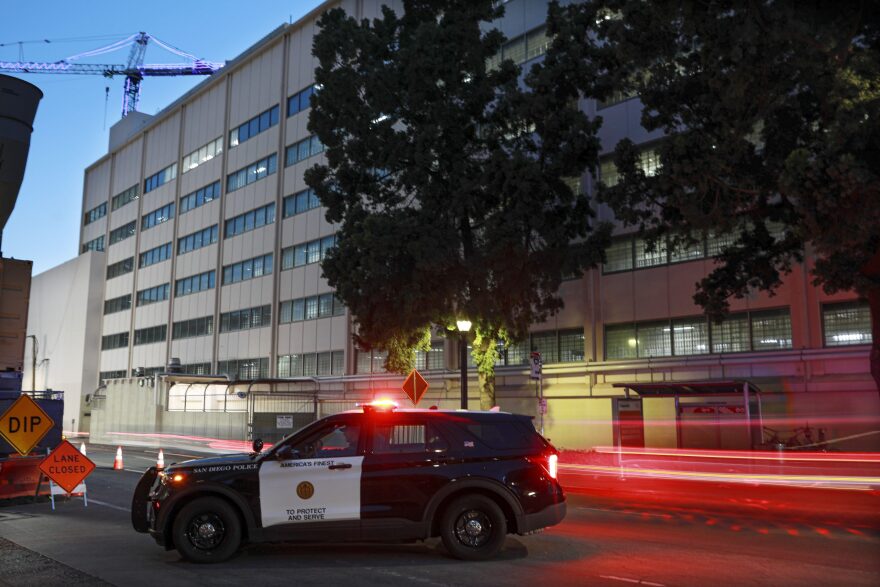The U.S. government is refusing to disclose whether a controversial federal jail in San Diego will shutter in March — or if a private prison company will use an unconventional workaround to keep it open.
Western Region Detention Facility is run by the for-profit corporation The GEO Group Inc., which has managed the facility for the U.S. Marshals Service since 2000. The federal jail primarily houses nonviolent offenders waiting to be arraigned, tried and sentenced.
The fate of Western Region has been in question since President Joe Biden issued an executive order in January 2021 that would phase out federal private prisons. But when GEO Group’s contract to run the San Diego facility expired in September, the company was granted a six-month extension through the end of March.
What will happen come April is the subject of speculation, frustration and now, litigation.
On Monday, the ACLU sued the Marshals Service for its failure to release documents explaining the plans for Western Region. The lawsuit says “the public deserves to know” what will happen to the facility and the detainees living there.
“This place has 770 beds, and it’s in downtown San Diego,” said Bardis Vakili, senior staff attorney for the ACLU of San Diego and Imperial Counties. “It incarcerates people in the San Diego community. It impacts us deeply. And yet there’s been no public information about what’s been happening.”
Vakili sent records requests to the Marshals Service in October and January, asking for contracts, emails and other documents about the future management of Western Region.
Under the Freedom of Information Act, the federal government must provide an initial response to public records requests in 20 to 30 business days. The ACLU never received responses to either request, according to its complaint.
“The requested government transparency is needed before the fast-approaching expiration” of the contract, the lawsuit says, in order for “members of the public to speak out about the issue in an informed manner in hopes of affecting the decision-making process going forward.”
The Department of Justice has paid GEO Group $75 million since October 2020 to operate Western Region, and the company will receive another $1.7 million by the end of March.
In August, GEO Group began negotiations with the small community of McFarland to try to keep Western Region open after the end of its contract.
McFarland — a financially strapped city located 250 miles north of San Diego — was trying to take over the contract for Western Region, then subcontract the prison operations to GEO Group.
The city estimated it would receive a $500,000 administrative fee for serving as an intermediary for the private prison company.
In September, San Diego’s ACLU chapter wrote an impassioned letter to the White House Domestic Policy Office calling the negotiations a “shell game” that would “set a dangerous precedent to allow prison corporations to recruit far-flung municipalities to help them defy White House criminal justice policy.”
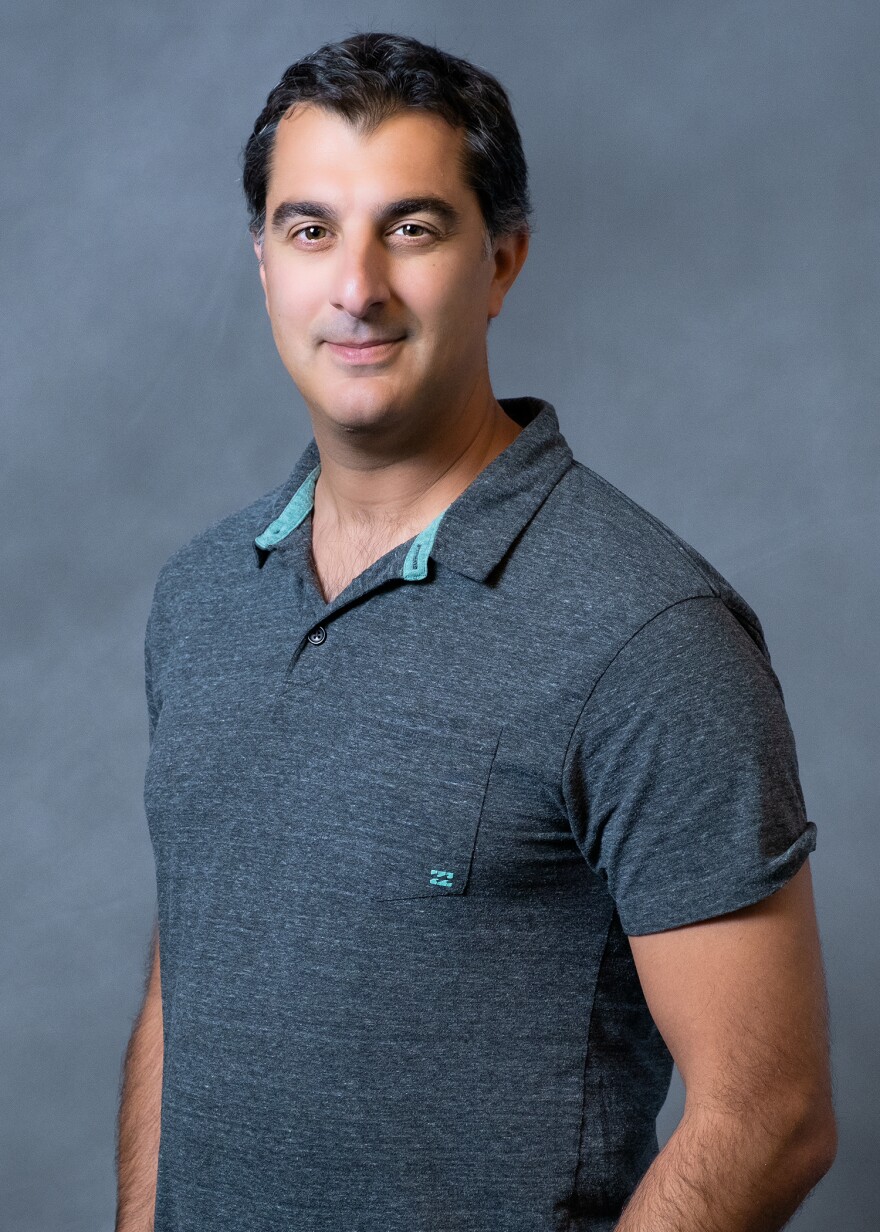
The White House acknowledged it received the ACLU’s letter, Vakili said, but never replied. A public records request the ACLU submitted to McFarland has not garnered a response either.
Weeks before the ACLU litigation, inewsource started combing through legal records, financial statements and federal contracts but was unable to find any public documents providing insights into the future of Western Region. Calls to government agencies, attorneys and unions with knowledge of the negotiations went unanswered.
McFarland would not respond to questions about its work with GEO Group, instead choosing to classify them as a request for documents under the California Public Records Act that would take at least three weeks to process “due to the voluminous number of categories of documents requested.”
Neither GEO Group nor the Marshals Service would explain its plans for the federal jail.
In a statement, spokesperson Lynzey Donahue said the Marshals Service “is committed to implementing the President’s Executive Order” and “is carefully examining its existing contracts with these facilities, mindful that any plans should avoid unnecessarily disrupting access to counsel, court appearances, and family support.”
A ticking time bomb
Western Region has been rife with accusations of mismanagement and unsafe living conditions for detainees.
In its lawsuit, the ACLU said GEO Group “systematically delays and deprives incarcerated individuals of medical care.”
The complaint cites the case of a 53-year-old woman with multiple sclerosis and anxiety who was denied her medications, causing her to suffer from seizures.
The ACLU added that it has recently “received reports of violence at (Western Region) due to improper supervision by GEO guards.”
GEO Group is also facing two class action lawsuits for its operations at Western Region. A case filed in 2019 alleges inmates with disabilities are not able to access showers and have suffered serious falls and injuries. Another lawsuit from November claims workers have been denied overtime pay.
The company’s handling of the pandemic has caused its own litany of complaints.
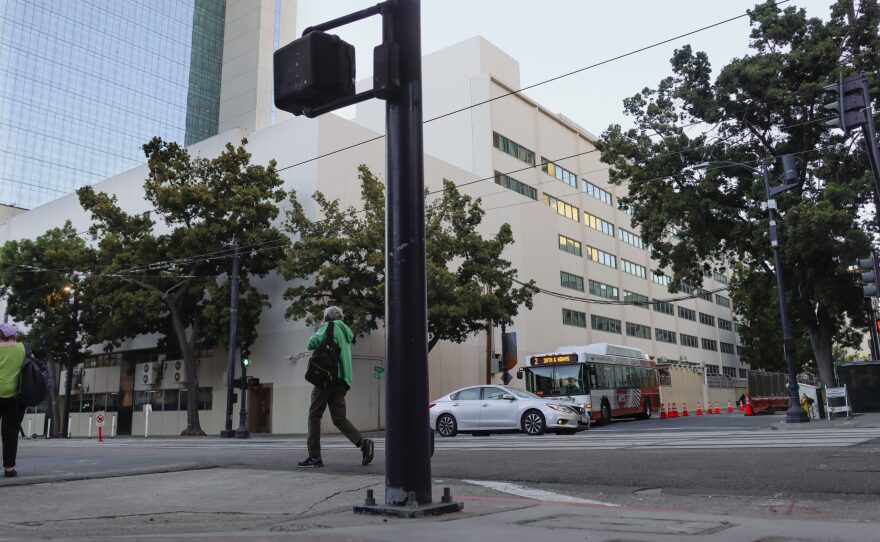
The Federal Defenders of San Diego, which represents many of the detainees at Western Region, warned in the first month of the pandemic that the facility was a “ticking time bomb” for COVID-19 infections.
The office has repeatedly asked the courts to release pre-trial defendants from custody and offer shorter sentences to those with serious medical conditions. Attorneys have argued their clients don’t pose a risk to the San Diego community — but the conditions inside the detention center pose a risk to them.
Yet defendants have continued to arrive at Western Region and develop serious COVID-19 infections. At least 250 people incarcerated there have contracted the virus since the start of the pandemic, according to the Marshals Service.
In one case, a pre-trial detainee caught the virus at the jail and died before he could be arraigned on his criminal charges.
New records obtained by inewsource tell the story of Lorenzo Laumbach, the only person incarcerated at Western Region known to have died from COVID-19. He was 66 years old.
Laumbach was arrested in September for smuggling methamphetamine across the U.S.-Mexico border. The court offered him a $15,000 bond, but he never paid it and remained incarcerated.
Nine days later, he was diagnosed with the virus.
A week after that, Laumbach experienced shortness of breath and was transported to Paradise Valley Hospital in National City. He continued to decline in health until his death on Sept. 23.
Laumbach had a history of COPD, a group of lung diseases known to exacerbate the severity of a COVID-19 infection.
Based on the terms of his bond, Laumbach would have been released from custody if a relative with $15,000 in assets paid the court $1,500 in cash.
Vakili, the ACLU staff attorney, described the bond as a fairly low to moderate rate for federal defendants, meaning the court likely didn’t consider him a serious risk to the community. But Laumbach may not have had the financial means to pay it.
“It’s just the definition of a senseless death,” Vakili said. “There is no reason that people charged with nonviolent crimes should be locked up solely because they’re poor.”
Documents show the U.S. Attorney’s Office for the Southern District of California has been resistant to offering lower bonds or releasing detainees from Western Region, despite pushback from activists and public defenders.
“My mind struggles with the fact that we are able to punish people and put them in environments where they can literally die,” said Khalid Alexander, president of Pillars of the Community in San Diego.
“You’re talking about Black and brown and poor white community members,” he added.
The Marshals Service said GEO Group is responsible for the medical care and pandemic protocols at Western Region. But GEO Group would not provide any information on COVID-19 precautions or case counts at the detention center. The company referred all questions to the Marshals Service.
Court records filed over the course of the pandemic repeatedly warn of dangerous conditions inside the private prison, including a lack of social distancing or medical care for the ill. At one point, the concerns prompted a hunger strike with roughly 100 detainees participating.
Days after Laumbach fell ill, another man in his housing unit developed a severe case of the virus. According to a declaration he wrote in court, Sergio Sevilla said he was denied medical care because he complained staff were improperly administering COVID-19 tests.
Sevilla said he was brought to Paradise Valley hospital twice with a COVID-19 infection and chest pains, but each time he returned to Western Region, GEO Group workers did not give him his medications.
The 65-year-old has a history of heart disease, high blood pressure and diabetes, which makes him more likely to develop complications from COVID-19.
“I was scared because another man from my housing unit recently died of COVID-19,” Sevilla wrote in his declaration. “I didn’t want that to happen to me.”
When Sevilla’s toilet clogged — leaving a quarter-inch of dirty water flooding the cell — guards refused to clean it up, court records show. Staff instructed the seriously ill detainee to clean the cell himself without gloves or sanitizer, and they did not let him take a shower for the following three days.
“No one — not even the youngest, most healthy inmate with the most serious criminal background — should be subjected to these conditions while serving their custodial sentence,” his attorney wrote in a court filing. “But Mr. Sevilla was.”
Sevilla was arrested on almost identical drug smuggling charges to Laumbach and was about two months away from finishing his sentence when he contracted the virus.
Sevilla asked the court to be released early, given his medical conditions and ongoing COVID-19 infection. He told the court he had a plan he would follow once released, and he was not a danger to the community.
“If I was released, I would be able to reconnect with my children and actually get the medical treatment I desperately need,” Sevilla wrote.
A judge denied the request.
Calls for reform
Government agencies, lawmakers, unions and community members have found themselves disagreeing over whether Western Region should stay in operation.
Staff at the federal jail are employees of the Marshals Service and members of the National Federation for Federal Employees. In August, the union sent a letter to Biden asking him to keep the facility open and save its members’ jobs.
“We respectfully ask that you stand with these hard-working Americans and save these 300 good union jobs,” the letter said, emphasizing the closure would have a “devastating economic impact.”
“Allowing this closure when it could easily be averted would be nothing short of cruel and inconsistent with the values of this Administration,” the union wrote
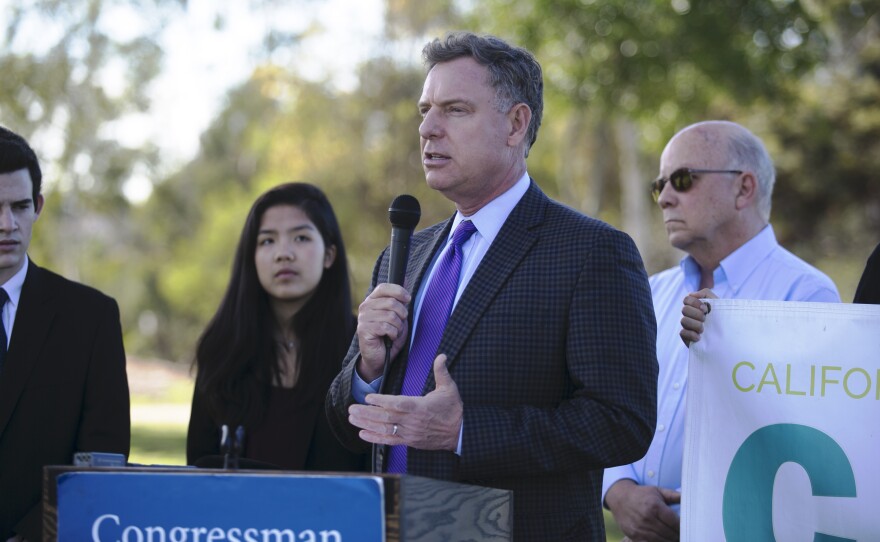
Rep. Scott Peters, whose district includes the detention facility, has also urged Biden to reconsider his plans for Western Region. In addition to job losses, Peters told the president in September that shutting down the facility could create problems for defendants who would have to relocate to other parts of the state.
“This dramatically limits the ability of detainees to meet with their legal teams as they prepare for trial or sentencing hearings and makes it extremely difficult for families to visit,” Peters said.
According to the congressman’s chief of staff, Peters’ office met with the federal employees union in the last week of January. During the meeting, the union said it expects Western Region will close on Mar. 31 and detainees will be sent to Victorville in San Bernardino County, where the next closest federal jail is located.
The federal employees union did not respond to calls or emails.
In addition to Western Region, San Diego County is home to one other private prison — the Otay Mesa Detention Center, which is run by the company CoreCivic. The facility houses detainees for U.S. Immigration and Customs Enforcement as well as the Marshals Service.
In 2019, about 116,000 state and federal detainees were housed in privately owned detention centers across the U.S., making up about 8% of the country’s incarcerated population.
Calls for prison reform have amplified in recent years, with elected leaders in the Democratic Party putting forward plans to limit government reliance on for-profit detention centers. In 2019, California banned federal private prisons from operating in the state, but the law has been tied up in the courts.
Biden’s executive order notes that private prisons “consistently underperform Federal Facilities with respect to correctional services, programs, and resources” and “do not maintain the same levels of safety and security for people in the Federal criminal justice system or for correctional staff.”
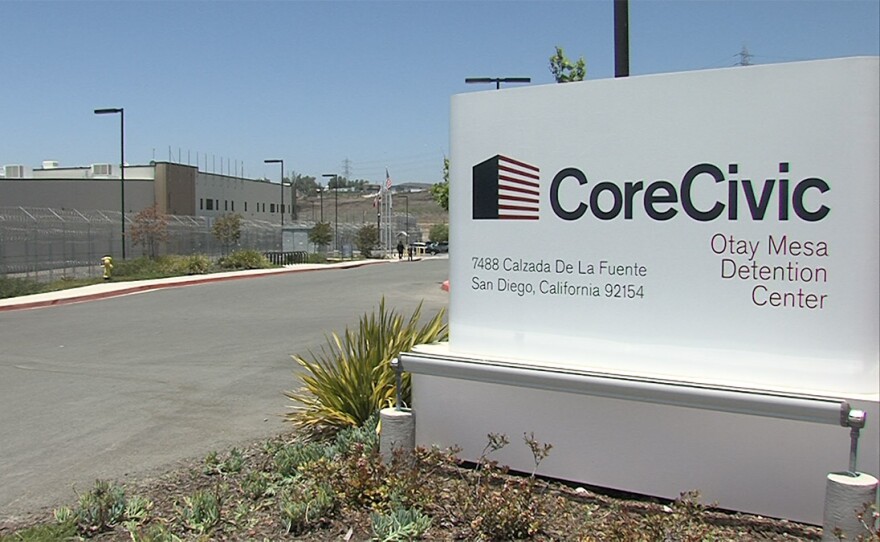
Community activists have argued private prisons are incentivized to cut costs and limit services like health care and education programs in order to make money.
“I think definitely that the private prison industry should be shut down,” said Malcome Morgan, a student at San Diego State University. Morgan said he was incarcerated in four private prisons while serving a sentence for an armed robbery.
“They profit off of crime,” he said. “In my books, anybody who makes a profit off a crime is technically a criminal.”
GEO Group operates 86,000 beds at 107 facilities across the United States, Australia, South Africa and the United Kingdom. In the first nine months of 2021, the company made $127 million in profit.
Hadar Aviram, a professor at UC Hastings Law, said public prisons are also privatized on the inside, with for-profit vendors providing services like food and health care. Major reforms are needed in all prisons to prevent incarcerated people from being kept in inhumane conditions, she said.
“The real question is not whether the facility is in name public or private,” Aviram said, “but how the facility is being operated, and do they even care about the people that they’re housing?”


